 I’ve been reading Animal, Vegetable, Miracle (Barbara Kingsolver) this summer, which puts great emphasis on how food — specifically local in the case of this book — brings people together, in celebration and as part of their culture. With that in mind, I’m pleased to tell you about an upcoming, worldwide event that uses the occasion of dinner toward making positive change. (Two of my favourite things in one — how could I resist?)
I’ve been reading Animal, Vegetable, Miracle (Barbara Kingsolver) this summer, which puts great emphasis on how food — specifically local in the case of this book — brings people together, in celebration and as part of their culture. With that in mind, I’m pleased to tell you about an upcoming, worldwide event that uses the occasion of dinner toward making positive change. (Two of my favourite things in one — how could I resist?)
The Feast Worldwide Vancouver
Saturday, October 18th
Groundswell Cafe & Learning Space
The Feast Worldwide is a day of global dinner parties in 40+ cities across 6 continents. The goal? To spark collaboration that drives local entrepreneurs and social initiatives forward.
On October 18, we’re inviting Vancouver to explore the global theme of progression through food and sharing. Join us in envisioning, “A world where growing and eating healthy food connects people.”
The idea is simple. Come for an interactive dinner that explores connections between food, community, technology, sustainability, business, health, design, and more! We’re inviting incredible entrepreneurs to share their work to inspire greater discovery and ideas. Let’s sit together over dinner — and instead of talking about problems, talk about ways to support each other, collaborate, and make things work better.
Register at Eventbrite and follow the Feast on Facebook for updates.
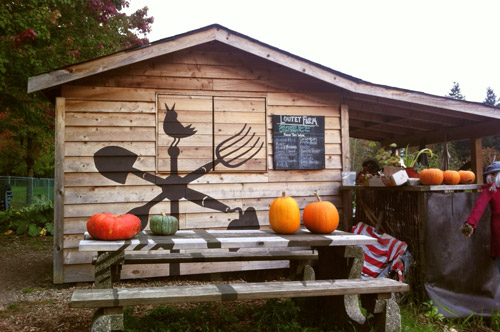
Here in Canada, we’ve already expressed our gratitude and enjoyed family meals together. If you’re south of the border, perhaps you’ll be inspired reading this.
I had the opportunity and pleasure to host and cook Thanksgiving dinner for my parents, at my own place, for the first time. (My sisters and their families stayed in their respective towns.) Naturally, I wanted the meal to be as local and organic as possible, since this is how I live, but it wasn’t until afterward that I thought to write about it.
This is the ultimate time of year to have a hearty, home-cooked meal full of delicious grub grown in your own backyard — literally or figuratively. My parents’ neighbourhood, however, doesn’t have good access to local, organic food, so I took care of all the veggies, procuring them at markets. This meant I missed out on Brussels sprouts, since they’re hard to find locally and a bit expensive. Ten years ago I never would have thought about growing them myself, let alone enjoying them.
Continue reading Where does your Thanksgiving meal come from? »
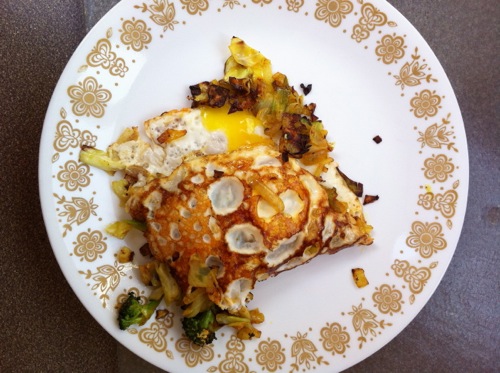
I’ve rediscovered the pleasure of cereal with fresh blueberries eaten in the sunny morning on my balcony. I’ll miss this terribly in the winter, when it will probably be dark and most certainly cold when I eat my breakfast, but one can find joy in it anyway. This poem came out of thinking about dining on my balcony in the fall, which I couldn’t really do last year for lack of outdoor furniture. After October and November wrote themselves, I simply had to keep going.
I realise this is not an ode but I couldn’t come up with a better title, so you’ll have to live with it. It’s inspired by Maurice Sendak’s beloved Chicken Soup with Rice — which taught me the months of the year — and by Molly Wizenberg’s delicious food essays in A Homemade Life, which I’m sad to have finished reading.
I should note while most of these are things I’d eat for breakfast, I should very much like more than a slice of bread and a mandarin orange. That would be a paltry breakfast, indeed.
An Ode to Breakfast
In January’s cupboard forage, a slice of bread and a mandarin orange.
In February’s dim and gloom, leftover soup with a silver spoon.
In March the weather starts to turn; for bacon and fried eggs I’ll yearn.
For April I’d like eggs poached, scrambled, boiled or on some toast.
In May I think I might just try to bake a morning apple pie.
In June I must not forget to make a basil omelet.
In July’s berry dream, a plate of waffles doused in cream.
For all of August, if you please, a bowl of cereal with blueberries.
In September’s temperamental weather, I think yogurt on granola’s better.
In October I shall eat hot pancakes on my balcony.
In November’s rainy weather, a bowl of porridge and a cosy sweater.*
For December’s hopeful snow, maple syrup poured on French toast.
* Eating sweaters is not recommended.

May 12 is Environmental Sensitivities Day.
First my nose stings, then it runs, then my eyes get itchy. The skin of my nose feels tight, swollen, even pink. My breath becomes shallow — at worst I have difficulty breathing at all. I probably start coughing. I feel stressed and anxious.
This is what happens when I’m exposed to synthetic fragrance. I’m not alone, and I’m lucky: for some people it can trigger asthma, headaches, and allergic reactions that are worse than mine. But it’s still not fun, and I feel like I’m the only one in the vicinity suffering. Sometimes, I’m the only one that can smell it.
I never had this problem until I did a detoxifying cleanse three years ago, which is why I don’t believe it when I read claims that people with my affliction are simply overburdened with toxins. I think it’s the other way around — that most people, generally unbeknownst to them, are full of toxins that are preventing reactions to toxic chemicals.
Continue reading Scents and sensitivity: go fragrance-free »
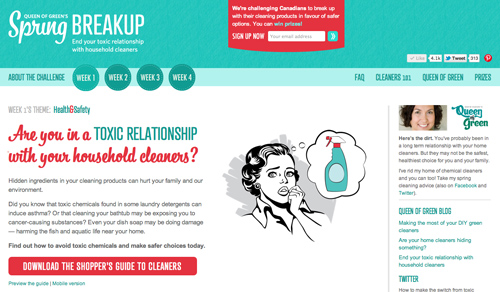
I’m not! I switched to vinegar and baking soda for most tasks years ago. I’m even considering making my own laundry detergent after I move out.
I have a confession to make, though: I used to like the smell of Mr. Clean. I’m sure a whiff of it now would send me into an allergic frenzy, but I broke up with Mr. Clean a long time ago. You can too, by going to SpringBreakup.ca, a campaign site my team at the David Suzuki Foundation recently launched with our Queen of Green.
Continue reading Are you in a toxic relationship with your household cleaners? »
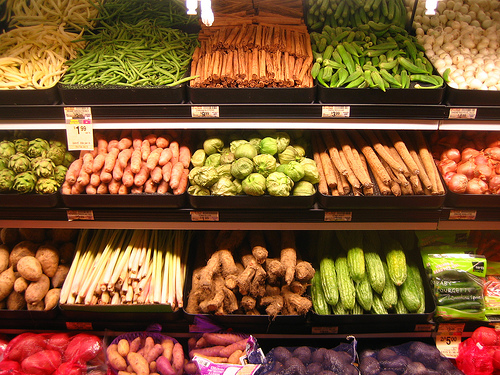
Uniform, flawless produce requires a heartbreaking amount of food waste. (Photo by
rick via Flickr)
If we’re to feed the world delicious, nutritious food and halt climate change, we have to kill the supermarket.
There are many reasons why I suggest this enormous beast be culled. It thrives on the unsustainable industrial agriculture model of large-scale, monocrop food production, where food is not grown for taste or nutrition. It’s then shipped long distances, so you can eat lettuce in Vancouver in January. Even if garlic is grown in your region, you’re served up the garlic from China instead.
The produce section is a sterile place devoid of scent (the first sense to get us salivating), where the fruits and vegetables are uniform, barely ripe (if at all) and virtually flawless. It’s no wonder children don’t know their food grows in the ground or on a vine: the produce is so unnatural, it hardly seems a product of nature. Its sprawling, dizzying vastness is a maze that encourages overconsumption and takes up excess land to, among other things, allow for extra-wide shopping carts. It makes buying junk food more appealing than buying produce through a combination of store positioning, packaging and price, and this leads to disease.
I could go on; the reason I’m going to focus on here, however, is its massive — and one could suggest criminal — contribution to food waste.
Continue reading Death to the supermarket »
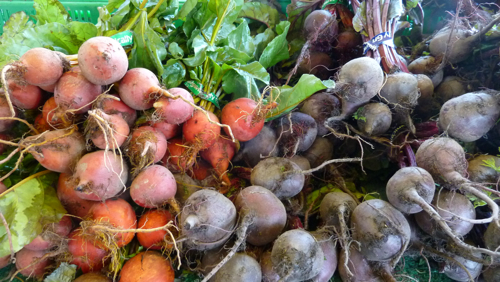
Update March 9: Today’s ethical deal is 50% off two Vancouver Farmers Markets memberships!
Following several mentions at this past weekend’s Greenest City camp of how food prices have risen in the wake of higher oil prices, I was reminded again by The National‘s coverage tonight. They examined which commodities have spiked most, how our food spending compares to other nations and how to save money.
The prices for grains, dairy and sugar — the latter of which is non-essential — have risen by 10% to 30%, reaching in some cases historical highs. When comparing food spending — Canadians put 11% of their income toward it, whereas the Chinese spend 36% and in Yemen 80% — it’s important to realise that while our food spending has trended downward, our health costs have increased dramatically. This relationship between food and health spending has much to do with the quality of our food. So while the CBC’s reporter suggests 11% is a good number, I disagree.
Rising oil prices, a trend that will inevitably continue as supplies dwindle and economies recover, are a reminder of just how much energy goes into agriculture from the field to the plate. For Americans, the combined cost of transportation and energy accounts for more than 10% of the cost of US-produced food, with the majority of each dollar going to marketing. Factor in how much of our food comes from other continents — bananas, cocoa, sugar, seafood, rice — and watch that energy cost go up.
Continue reading Rising oil prices make local food and farmland even more crucial »
These days, we expect everything of significance to be recorded and made available on on the Internet, so I’m thankful for GOOD Magazine food editor Nicola Twilley’s written recap of an event I assumed I’d find online. (Maybe later it’ll turn up.) My favourite author, Michael Pollan (In Defense of Food), and Fast Food Nation author Eric Schlosser had a fascinating conversation with Evan Kleiman (host of KCRW’s Good Food) that managed to shock and inform me despite all the knowledge I’ve accumulated about food issues. What stood out most for me was this:
When Evan Kleiman asked whether a sustainable food system could feed the world, Pollan was quick to point out that “we’re not feeding the world with the system we currently have.” Schlosser added that the problem is not one of production, but rather distribution: “We live in a world where a billion people are hungry and another billion are obese, and only between 12 and 14 percent of the food we grow is actually eaten by people.” (75 percent is fed to livestock, and of the remaining 25 percent, roughly half is wasted along the way, he elaborated.)
Wow. Pollan’s blunt remark spelling out what should be an obvious truth pulls the rug out from under our system’s fundamental theory. Schlosser’s statistics are at the same time utterly tragic and darkly ironic.
And this revelation from Pollan reminded me of The 100-Mile Diet‘s account of the time spent on gathering and preparing food now versus 50 or 1000 years ago: “Over the past decade, we’ve somehow found 2 extra hours each day to be online, but we say we don’t have time to cook.” Indeed. (Zing.)
Read the rest of it at GOOD with links to further recaps.
 This daily green blog challenge is in celebration of David Suzuki’s 75th birthday, supporting the David Suzuki Foundation. Please help me out by sponsoring me online now.
This daily green blog challenge is in celebration of David Suzuki’s 75th birthday, supporting the David Suzuki Foundation. Please help me out by sponsoring me online now.
Note: I am writing solely on my own behalf, and do not claim to represent the David Suzuki Foundation or its views here.
Last night I watched a shocking episode of CBC Marketplace about superbugs in supermarket chicken. I knew about the routine use of antibiotics in factory farm animals — which account for most of our meat production, the most popular of which is chicken — but the degree to which antibiotic-resistant bacteria (aka superbugs) have developed is a disturbing new revelation. Daily use of antibiotics, often the same ones administered to sick humans, are being given to healthy and ill chickens alike. If chickens, cows, pigs and so forth had a natural diet and weren’t kept in such cramped conditions, the incidence of disease would be extremely low. Antibiotics wouldn’t be necessary, preventative or otherwise. Disease outbreaks would also be uncommon.
The human health threat posed by the presence of antibiotic-resistant bacteria — found on two-thirds of the 100 chicken packages sampled — has the potential to return us to pre-1930s conditions, says the study. Is the public health risk really worth cheaper chicken prices?
Antibiotics also kill the helpful bacteria in our gut, so I can only imagine how sick the patients profiled in this episode are from multiple attempts to cure their antibiotic-resistant infections.
This is just another reason among many — animal ethics, environment and others — to return to sustainable farming methods.
 This daily green blog challenge is in celebration of David Suzuki’s 75th birthday, supporting the David Suzuki Foundation. Please help me out by sponsoring me online now.
This daily green blog challenge is in celebration of David Suzuki’s 75th birthday, supporting the David Suzuki Foundation. Please help me out by sponsoring me online now.
Note: I am writing solely on my own behalf, and do not claim to represent the David Suzuki Foundation or its views here.
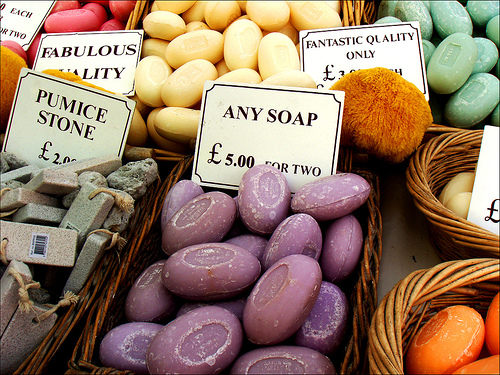
Fragrances lurk in all sorts of consumer products. They can be a toxic chemical soup of ingredients manufacturers aren’t required to disclose. (Photo by
Karin Bultje via Flickr)
Yesterday on transit, a woman began applying a hand lotion that, unbeknownst to her, triggered an allergic reaction in the passenger seated next to her. As the doors opened every few minutes, ushering in “fresh” air, I gasped for it, a brief relief from the fragrance from which I could otherwise not escape except by moving elsewhere. It wasn’t that the odour was unpleasant. This isn’t usually my problem. It’s that the chemicals in the fragrance irritate my nose — or brain, rather — in various ways, the worst of which is actually pain. I met a bus driver with the same issue: she spends her workday with a scarf covering her face.
So you can imagine when I walk into a department store where the perfumes invade the doorway that I hold my breath and scamper through as quickly as possible. I’ve done that years, but my reaction has developed in the last year and a half. While it’s unpleasant, it’s probably a good thing because it’s made me aware of the health problems associated with fragrance, also known as parfum, and helps me avoid it. But it’s pretty hard to avoid the scent left on my hands after using a public washroom.
Continue reading Fragrances not as lovely as they smell »
 I’ve been reading Animal, Vegetable, Miracle (Barbara Kingsolver) this summer, which puts great emphasis on how food — specifically local in the case of this book — brings people together, in celebration and as part of their culture. With that in mind, I’m pleased to tell you about an upcoming, worldwide event that uses the occasion of dinner toward making positive change. (Two of my favourite things in one — how could I resist?)
I’ve been reading Animal, Vegetable, Miracle (Barbara Kingsolver) this summer, which puts great emphasis on how food — specifically local in the case of this book — brings people together, in celebration and as part of their culture. With that in mind, I’m pleased to tell you about an upcoming, worldwide event that uses the occasion of dinner toward making positive change. (Two of my favourite things in one — how could I resist?)




 Uniform, flawless produce requires a heartbreaking amount of food waste. (Photo by
Uniform, flawless produce requires a heartbreaking amount of food waste. (Photo by 

 Photo by
Photo by  Fragrances lurk in all sorts of consumer products. They can be a toxic chemical soup of ingredients manufacturers aren’t required to disclose. (Photo by
Fragrances lurk in all sorts of consumer products. They can be a toxic chemical soup of ingredients manufacturers aren’t required to disclose. (Photo by